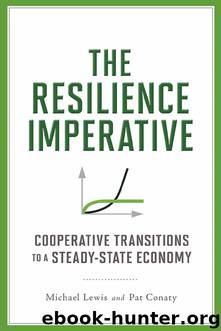The Resilience Imperative by Michael Lewis

Author:Michael Lewis
Language: eng
Format: epub
ISBN: 9781550925050
Publisher: New Society Publishers
London Rebuilding Society
A very different strategy is under development at the London Rebuilding Society (LRS), a community lender that focuses on financing for social enterprises and ethical businesses. As one of its several services, LRS developed in 2006 a mutual aid fund (MAF) targeting immigrants and refugees with no access to conventional sources of enterprise finance. Many of the attracted groups are immigrants from African countries. The MAF has two categories of members — investors and MAF borrowers. LRS helps each group establish a mutual aid fund from which it can distribute small loans to its members. Investments from MAF groups form a pool of share capital that LRS holds to guarantee loans. Up to $4 in loans are leveraged from every $1 provided as a guarantee. As the MAF groups are established, a share account is put in place so groups can add to the share capital in the guarantee fund. Typical groups are nonprofit, social enterprise, and self-help organizations representing a particular community. LRS encourages share investment of available unrestricted funds or community donations raised by the MAF group.
As its name indicates, the primary methodology of MAF is to foster mutual support of members who have similar ideas and interests. For example, a MAF group of self-employed people working in the same sector would collaborate to identify ways they might work together — a group of small-scale caterers might consider leasing space for a collective kitchen or organizing bulk purchasing.
In order to extend its capacity to support MAF groups, LRS reaches out to a range of community organizations willing to help, providing them with training and coaching on how to support enterprise development within MAF groups. An attraction of the MAF approach is that it is similar to the group-based savings-and-loan systems used in rural African communities.
In its first four years, the LRS program has seen the establishment of 21 MAF groups of between 50 and 100 members. A unique feature of this model is that it is the MAF members themselves who recommend loans to the people and enterprises in their group. LRS trains each MAF in lending methods. Once a decision is made, the loan is advanced by drawing down a multiple of the MAF group’s share capital from LRS. Interest is charged at a rate of 6 percent up to a maximum sum of £10,000, and loans are repayable over three to five years, with no capital repayments required in the first year of the loan. By 2009, LRS had provided over £350,000 in loan guarantees. The loans secured through the guarantee are for diverse purposes, including social enterprise loans, working capital for women market traders, and finance for enterprise start-ups.
Each MAF group designs its own loan products and services to meet the needs of its members and the different MAF communities. In some MAF groups, personal loans are entertained — for example, to cover funeral costs. LRS works with each group to design its own products and services to support the borrowers, and also gives the groups access to software and loan-management systems.
Download
This site does not store any files on its server. We only index and link to content provided by other sites. Please contact the content providers to delete copyright contents if any and email us, we'll remove relevant links or contents immediately.
| Arms Control | Diplomacy |
| Security | Trades & Tariffs |
| Treaties | African |
| Asian | Australian & Oceanian |
| Canadian | Caribbean & Latin American |
| European | Middle Eastern |
| Russian & Former Soviet Union |
The Secret History by Donna Tartt(16618)
The Social Justice Warrior Handbook by Lisa De Pasquale(11489)
Thirteen Reasons Why by Jay Asher(7786)
This Is How You Lose Her by Junot Diaz(5767)
Weapons of Math Destruction by Cathy O'Neil(5034)
Zero to One by Peter Thiel(4823)
The Myth of the Strong Leader by Archie Brown(4789)
Promise Me, Dad by Joe Biden(4444)
Stone's Rules by Roger Stone(4415)
Beartown by Fredrik Backman(4413)
How Democracies Die by Steven Levitsky & Daniel Ziblatt(4396)
The Fire Next Time by James Baldwin(4341)
100 Deadly Skills by Clint Emerson(4075)
A Higher Loyalty: Truth, Lies, and Leadership by James Comey(4031)
Rise and Kill First by Ronen Bergman(4012)
The David Icke Guide to the Global Conspiracy (and how to end it) by David Icke(3880)
The Farm by Tom Rob Smith(3871)
Secrecy World by Jake Bernstein(3782)
The Doomsday Machine by Daniel Ellsberg(3730)
